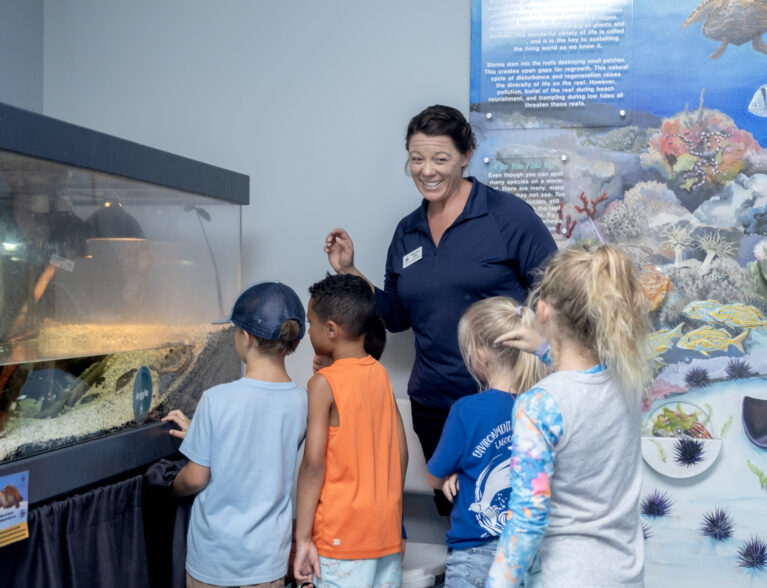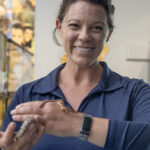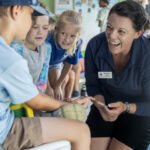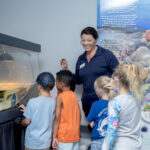
The Environmental Learning Center’s newest team member, Shanen Cox, knew she wanted to train killer whales after being mesmerized as a kid watching the now-classic 1993 film “Free Willy.”
Her grandparents took her to the Miami Seaquarium to see an Orca up close, and the flirtation blossomed into obsession. A career in marine biology training marine mammals seemed her destiny at a young age.
“I thought they were just the most gorgeous, amazing animals ever,” said Cox, now the ELC’s environmental educator and director of guest services.
She buckled down on her studies and graduated from high school early. “Then I ran away to college in Hawaii as fast as I could, where I was once again surrounded by water.” While earning a bachelor’s degree in marine science from Hawaii Pacific University, Cox volunteered at nearby Sea Life Park on Oʻahu, working in the touch tank and sea turtle enclosure.
She also helped release sea turtle hatchlings back into the wild. Later she worked part-time at the park as a photographer, taking photos of guests as they interacted with dolphins and trainers. That led to a six-month unpaid internship, with college credit, and eventually a paid position as an animal trainer.
“I’m really proud to say that I had achieved my dream job – and I was only 19,” Cox said.
While in Hawaii, she met her husband Kevin. In 2010 the couple moved to Kevin’s home town where Shanen took a job as a trainer at SeaWorld San Diego working with dolphins, killer whales, seals, sea lions and otters.
“I learned a lot of different concepts and theories of animal training during my eight years at SeaWorld,” Cox said. “There were a lot more species to work with and a lot more room for growth.”
After SeaWorld, Shanen Cox worked as a marine mammal hormone scientist at the National Oceanic and Atmospheric Administration’s (NOAA) Southwest Fisheries Science Center in La Jolla, California. She collected and studied blubber samples from marine mammals to record changes in hormone levels based on the animal’s exposure to things like sonar.
When the NOAA project was eliminated during the COVID-19 pandemic, Shanen and Kevin Cox moved back to Florida, where Shanen Cox took a job at Harbor Branch Oceanographic Institute in Fort Pierce, performing photographic surveys of bottlenose dolphins in the Indian River Lagoon, and collecting stranded injured and deceased animals. Kevin took a job as a real estate recruiter.
In March, Cox began working for the ELC, just off the Wabasso Causeway near Orchid. “I’m having so much fun. It’s a fantastic place to work,” she said. The ELC has a contract with the school system that enables all third and fourth graders to take field trips to the ELC, where they learn about the flora and fauna in and around the Indian River Lagoon. Summer camps for all elementary and middle schoolers are underway.
Photos by Joshua Kodis
- Shanen Cox
- Shanen Cox passes around a snake to kids at the ELC.
- Shanen Cox teaches a group of kids about turtles during one of their summer camp activities at the ELC.






